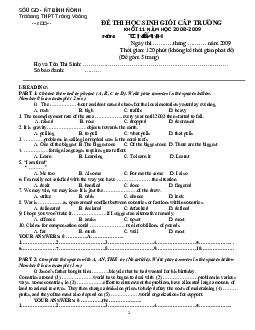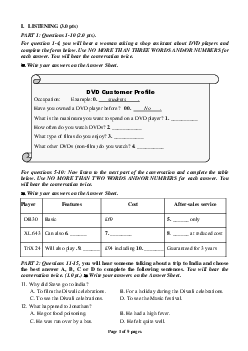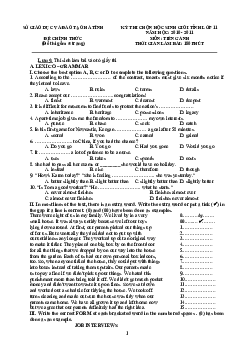







Preview text:
SỞ GIÁO DỤC VÀ ĐÀO TẠO HÀ NỘI
KỲ THI CHỌN HỌC SINH GIỎI LỚP 11
TRƯỜNG THPT LÊ QUÝ ĐÔN
Môn : TIẾNG ANH- VÒNG 3
(Đề thi có 8 trang) Thời gian thi: 90 phút (Không kể thời gian giao đề)
Họ và tên thí sinh:…………………………………...lớp11.......
*Thí sinh không được sử dụng tài liệu kể cả từ điển.
* Thí sinh làm bài trực tiếp vào đề thi
* Giám thị không giải thích gì thêm. I. LEXICO-GRAMMAR
a. Circle the word or phrase that best completes each sentence A, B, C or D. 1.
I ran in a marathon last week, but I wasn’t fit enough. I __________ after 15 kilometers A. dropped out B. moved in C. showed off D. closed down 2.
He’d hardly finished doing his homework when you arrived, __________? A. had he B. hadn’t he C. didn’t you D. would he 3.
Are there enough apples for us to have one_______? A. every B. each C. individually D. self 4.
_______ with being so busy both at work and at home, she became increasingly tired and bad- tempered. A. Where B. Which C. How D. What 5.
He's always trying _______ me. A. to avoid to meet B. avoiding meeting C. to avoid meeting D. avoiding to meet 6.
From the hotel there is a good________ of the mountains. A. vision B. view C. sight D. picture 7.
I can't make anything ____ his writing. A. of B. in C. from D. out 8.
I will keep your application ______ file. A. in B. with C. on D. at 9.
It’s ridiculous for him _____in central Athens at his age. A. to have driven B. to be driven C. to be driving D. driving
10. Jack: I’d rather stay at home. Gina: ___________. A. Would you? B. Wouldn’t you? C. Had you? D. Hadn’t you?
11. She had the ability to engage ________ young minds. A. to B. in C. with D. on
12. The blue curtains began to________ after they had been hanging in the sun for two months. A. fade B. die C. dissolve D. melt
13. The rain seems to have set________ for the evening. A. upon B. about C. in D. down
14. He looked at her and his hand pulled out a ______ of money from his pocket to give her some. A. wad B. pile C. sheet D. piece
15. We can form a negative verb by adding the prefix________ to the verb “lead”. A. un- B. dis- C. mis- D. im-
16. Oh, no. Thanks. It’s not that I don’t drink, _______ that I don’t drink and drive. A. but also B. but rather C. except D. so
17. Don’t forget to do as I have told you, Huong. - _____________. A. Yes, I won’t B. No, I won’t C. Yes, I will D. No, I will remember
18. How long does it take to get to the City Library from here? - _____________ . A. Yes, it’s a long way B. It isn’t very far
C. I am sorry I don’t know D. You can go there by bus
19. He said that Mary ________ as though she _______ in the heaven then. A. looked/ had been B. looked/ were C. had looked/ had been D. looked/ could have been
20. Politicians often promise to solve all a country’s problems ________.
A. thick and fast B. on the whole C. of set purpose D. at a stroke
21. ___________we refused to cooperate further. A. Such was our annoyance that B. Such our annoyance was that
C. So much our annoyance was that D. Our annoyance was so that
22. Did you really understand all _______ he said? A. what B. when C. which D. that
23. Try as I _______ , I couldn't turn the key. A. might B. should C. would D. could
24. I borrowed a _______ bike and went into town in the lunch break. A. friend of mine's B. friend of my C. friend's of my D. friend's of mine
25. He escaped by _______ A. the hair's breadth B. the breadth of a hair C. a breadth of a hair D. a hair's breadth
26. In such a complex situation as this mistakes _______ happen occasionally. A. are bound to B. bound C. bound to D. bound to
27. I am not _______ "Mr.". It's no problem if you call me Peter. A. using to address B. used to addressing
C. used to being addressed D. used to be addressed
28. I promise to get down to work as soon as I _______ from my trip abroad. A. am returning B. will have returned C. have returned D. returned
29. Could you show us _______ photos from your expedition, Brian? A. others B. some other C. another D. one another
30. Nobody else is guilty of the fraud. You are the only one ________ . A. to blame B. a blame C. as blame D. blaming
b. Fill an appropriate preposition/ particle into each gap
Instructor: Well, let’s start warm (31) ________ those muscles.
Christine: I’m really starting to enjoy these sessions. I never thought I’d be able to say that when we started. Jenny:
Yes, everyone’s impressed when I tell them I’m doing circus training. Anyway, before we get
(32) ___________ (33) ___________ breath, tell me about Sue and Peter – is it true they have
broken (34)____________?
Christine: Yes, and I think it’s (35) ___________ the best, really. It’s about time she woke
(36)_________ (37) ________ his cheating. He’s been seeing Lucy for a month now. Jenny:
How did she find (38) ________?
Christine: Well, apparently Sue caught him ringing Lucy (39) ________. When she asked him what he
was doing, he just clammed (40) ______, and she couldn’t get a word (41) ______ of him. Jenny:
Did he try to stop Sue leaving?
Christine: Oh, yes, of course. He promised to make (42) ________ (43) ________ the way he had
treated her, but she wasn’t interested. Jenny: Good for her. How is she?
Christine: Fine, actually. I wouldn’t have been surprised if she had cracked (44) ________, as she’s
always seemed to depend (45) ________ him, but she’s quite philosophical (46) _______ it.
After all, she’s chalked (47) ________ some happy relationships in the past.
Instructor: Come (48) _______, you two, stop talking. You are (49) _______ the others. Jenny:
Oh, I hadn’t realised. We’d better catch (50) _____. You can finish telling me about it later.
c. Fill ONE suitable word in each blank to complete the sentence.
51. She spent a long time looking for a sofa that would ____________________________ the carpets.
52. Would it be more ___________________ for you if I came to your house, instead of you to mine?
53. The flight gets in at nine o'clock, so allowing ____________________ passports and customs I should
be out of the airport by ten o'clock.
54. On __________________ thoughts, I will have another drink.
55. Please be patient and make _________________________ for the fact that she's not well. II. READING
a. Read the passage and do the tasks followed.
In the world of birds, bill design is a prime example of evolutionary fine-tuning.
Shorebirds such as oystercatchers use their bills to pry open the tightly sealed shells of their prey;
hummingbirds have stiletto-like bills to probe the deepest nectar-bearing flowers; and kiwis smell Line
out earthworms thanks to nostrils located at the tip of their beaks. But few birds are more (5)
intimately tied to their source of sustenance than are crossbills. Two species of these finches,
named for the way the upper and lower parts of their bills cross, rather than meet in the middle,
reside in the evergreen forests of North America and feed on the seeds held within the cones of coniferous trees.
The efficiency of the bill is evident when a crossbill locates a cone. Using a lateral
motion of its lower mandible, the bird separates two overlapping scales on the cone and exposes
the seed. The crossed mandibles enable the bird to exert a powerful biting force at the bill tips,
which is critical for maneuvering them between the scales and spreading the scales apart. Next,
the crossbill snakes its long tongue into the gap and draws out the seed. Using the combined
action of the bill and tongue, the bird cracks open and discards the woody seed covering action
and swallows the nutritious inner kernel. This whole process takes but a few seconds and is
repeated hundreds of times a day.
The bills of different crossbill species and subspecies vary - some are stout and deep,
others more slender and shallow. As a rule, large-billed crossbills are better at seeming seeds
from large cones, while small-billed crossbills are more deft at removing the seeds from small,
thin-scaled cones. Moreover, the degree to which cones are naturally slightly open or tightly
closed helps determine which bill design is the best.
One anomaly is the subspecies of red crossbill known as the Newfoundland crossbill.
This bird has a large, robust bill, yet most of Newfoundland's conifers have small cones, the
same kind of cones that the slender-billed white-wings rely on. (10) (15) (20)
56. What does the passage mainly discuss?
(A) The importance of conifers in evergreen forests
(B) The efficiency of the bill of the crossbill
(C) The variety of food available in a forest
(D) The different techniques birds use to obtain food
57. Which of the following statements best represents the type of "evolutionary fine-turning" mentioned in line 1?
(A) Different shapes of bills have evolved depending on the available food supply
(B) White - wing crossbills have evolved from red crossbills
(C) Newfoundland's conifers have evolved small cones
(D) Several subspecies of crossbills have evolved from two species
58. Why does the author mention “oystercatchers, hummingbirds, and kiwis” in lines 2-4?
(A) They are examples of birds that live in the forest
(B) Their beaks are similar to the beak of the crossbill
(C) They illustrate the relationship between bill design and food supply
(D) They are closely related to the crossbill
59. Crossbills are a type of________. (A) shorebird (B) hummingbird (C) kiwi (D) finch
60. The word "which" in line 12 refers to (A) seed (B) bird (C) force (D) bill
61. The word "gap" in line 13 is closest in meaning to (A) opening (B) flower (C) mouth (D) tree
62. The word "others" in line 18 refers to__________. (A) bills (B) species (C) seeds (D) cones
63. The word "deft" in line 19 is closest in meaning to_________. (A) hungry (B) skilled (C) tired (D) pleasant
64. The word "robust" in line 23 is closest in meaning to___________. (A) strong (B) colorful (C) unusual (D) sharp
65. The final paragraph of the passage will probably continue with a discussion of
(A) other species of forest birds
(B) the fragile ecosystem of Newfoundland
(C) what mammals live in the forests of North America
(D) how the Newfoundland crossbill survives with a large bill
b. Some paragraphs A-H have been removed from the passage. Write the corresponding letters A-H
into their correct places .
One night, not so long ago, just as I was drifting off to sleep, the phone rang. It was my 19-year-old son,
who is at university in Edinburgh, calling to say that he had broken up with his girlfriend at midnight and
he had been wandering around the city ever since, not knowing what to do. I told him to catch the first
train home. He arrived looking a wretch, but after a good sleep and some home cooking he began to feel his old self again. 66. _______
Girls I knew then were fairly open with their mothers, but none of my male contemporaries would ever
have admitted asking their mothers for advice. Despite all our talk about how important it was for men to
let down their defences and learn how to express their feelings, most of us still secretly felt that any man
who depended on his mother too much was a bit of a mummy’s boy. 67. ________
But things don’t work that way anymore. In a world of short-term contracts, downsizing and redundancy,
even the most promising and ambitious of our children will go through many career highs and lows during
their twenties, and whenever they hit those depths, many of them will return to the nest. A typical son will
continue to be at least partly dependent on his mother well past the age of 18. 68. ________
They’re also better able to see through the mask of apparent self-confidence. When my boy was growing
up, he always maintained a fairy invincible front. His early imaginary play involved sieges, ambushes and
surprise attacks. His starting point, though, was always a danger against which he needed to defend
himself. He used the games to convince himself that he could prevail. 69.________
In his teens, he used many of these same tricks to keep me at bay. If I drove him anywhere to meet his
friends, he insisted I drop him off out of the sight of where they were waiting. There were girlfriends I
never met, and phone conversations which were all in code. But occasionally, a confidential mood would
come over him and he would tell me whatever happened to be on his mind. 70. ________
‘And there’s another important change’ she adds. ‘Most of us took pains to reassure our sons that it was
okay for them to show physical affection or cry when they were upset. If our boys are not so anxious now
about showing their emotions, our efforts in this area have not been in vain.’ This seems to be backed up
by research, which shows that boys call their mothers on their mobile phones more than anyone else. 71. ________
The mothers at the other end of the line often have correspondingly low expectations. But we try to keep
our anxieties at manageable levels by saying; ‘All right, you can stay out until four in the morning, but
only if you call me every hour to let me know you’re okay.’ Those of us who add the offer, ‘And if you
need a lift, let me know’, often regret it. Most phone calls will begin: ‘I’m at the station. When can you pick me up?’ 72._________
What I didn’t anticipate was for the same thing to happen with my son. I assumed I would lose him, just
like all the experts said. It may be that they were wrong all along – that sons have always confided in their
mothers – and just made sure that no one else knew. Have I stumbled on motherhood’s best-kept secret?
Even if I have, it doesn’t diminish my sense of wonder. It’s still like getting a present you never expected
A. These days, however, mother can expect to be relied on almost indefinitely for the type of advice that
calls on our experience of the outside world. A generation ago, it was accepted that sons would eventually
leave their mothers to join the world of men and work. Mothers put their 18 years in and then opened the
door to allow their sons to move into jobs for life.
B. Friends told me that they, too, were getting the same volume of confidences. Celia Pyper says this is
normal behavior for today’s boys: ‘Our sons will tell us more than their fathers told their mothers, because
we have brought them up to do so. Our norm has been to empathize with our children when they tell us
about their actions or feelings, whereas the previous generation tended to be shocked.’
C. Many of my friends are surprised at this reluctance of their 20-something sons to break away. But
according to psychotherapist Cella Pyper, the mother-son intimacy is nothing new. ‘Mums have always
been easier to talk to,’ she observes. ‘They’re more cuddly than their fathers, and sons realize early on that
their mothers are more accepting of human frailty.’
D. They are not in any doubt about how to respond to the situation. As one friend said of her rather
reticent son: ‘My job is to give my son courage.’ And whilst we might welcome the chance to see more of
our children, one does have the feeling that there is something anti-natural in all this.
E. ‘But don’t assume that girls are any tougher than boys,’ says Celia Pyper. ‘Daughters need their mothers
too.’ Certainly, I know how much my own daughters need me. But this continuing mother-daughter bond is something I expected.
F. This, alone, may not imply closeness, however, Rob rings his mother from university three times a
week, but says he is careful to edit what he tells her. And although he’ll approach her for advice on
practical issues, when it comes to matters of the heart: ‘Why would I go to my mother or my father, after
the mess they’ve made of their lives?’ he asked.
G. The next afternoon he told me what had happened. Then he told me more and more and even more. A
moment arrived when I couldn’t help asking myself, should I be hearing all of this? It wasn’t that I was
shocked. He reminded me of myself in my own student years, but with one important difference – I would
never ever have confided in my parents this way.
H. As he got older and had to ride to school on a bus, with other children, all too often there were
situations in which he didn’t. I had to teach him how to put up new defenses so that his rougher classmates would not see his weaknesses. III. WRITING
a. There is one mistake in each of the following sentences. Underline the mistakes and correct them. Your corrections
73. Ragtime is a musical form developed and brought to maturation between 1890 73. _____________
and 1910 which is rooted in several musical traditions.
74. Although absolute zero cannot actually be reached, approximations of less 74. _____________
than 0.001 degrees Celsius above absolute zero have been created by the laboratory.
75. After the social science lecturers all students are invited to take part in a 75. _____________
discussion of the issues which were raised in the talk.
76. The rapid advance of modern anthropology since the end of the nineteenth 76. _____________
century has been the most important single influence on the growth of myth criticism.
77. Switzerland is a small but highly developed country lying among France, 77. _____________ Germany, Austria and Italy.
78. On Long Island’s Montauk Point located a stone lighthouse 168 feet high, 78. _____________
equipped with a flashing light white, and a United States lifesaving station.
79. Intricate choreographer emphasized on the beauty and virtuosity of the 79. _____________
nineteenth-century prima ballerina, while the male dancer functioned only as her
partner in the twentieth century.
80. Standard Tires have agreed to fund any further research into the manufacture 80. _____________ of latex.
b. Fill in the blanks with the correct form of the words in brackets. LANGUAGE CHANCE
The phenomenon of language change probably attracts more public notice and more (81) ______
(disapprove) than any other linguistic issue. There is a widely held belief that change must mean
deterioration and decay. Older people observe the cause speech of the young and conclude that standards
have fallen (82) ______ (appreciate).
It is understandable that many people dislike change, but it is (83) _____ (wise) to condemn all linguistic
(84) ______ (modify). It is often felt that contemporary language illustrates the problem at its worst, but
this belief is shared by every generation.
There are indeed cases where linguistic change can lead to problems of unintelligibility and (85) _______
(ambiguous) and if change is too rapid there can be major communication problems. But as a rule, the
parts of language which are (86) ______ (go) change at any given time are relatively small in comparison
to the vast, unchanging areas of language. It is because change is so (87) ______ (frequent) that it is so
distinctive and (88) _____ (notice). Some degree of caution and concern is therefore always desirable for
the (89) _____ (maintain) of precision and (90) _______ (affect) communication but there are no
grounds for the extremely pessimistic attitudes so often encountered. Your answers:
81. ……………….………………...…
82. ………………….……….……
83. ……………………………………
84. …………………….…….……
85. ……………….………………..…
86. ………………….……….……
87. ………………….………….……
88.……………………..……….…
89. ……………….…………………..
90. ……………………………….
c. Finish each of the sentences in such a way that it means exactly the same as the sentence printed before it.
91. When the goods arrive at the shop, they are inspected carefully.
On____________________________________________________________________________
92. I was greatly relieved to hear that her condition was not serious.
It was__________________________________________________________________________
93. You can use it as long as you like, and it will not wear out.
No____________________________________________________________________________
94. Although the ticket may seem expensive, it is good value for money.
Expensive______________________________________________________________________
95. Jack isn’t so much interested in Lisa as in her parents’ big fortune.
Lisa__________________________________________________________________________
96. It’s not our concern what they do after lessons.
It is of________________________________________________________________________
d. Complete the second sentence so that it has a similar meaning to the first sentence, using the
word given. Do not change the word given in any way.
97. The Wrights don’t have much money to live in comfort. (meet)
______________________________________________________________________________
98. We were all shock by the rude response that the boy gave to his loving mother. (aback)
______________________________________________________________________________
99. I’m trying to concentrate, but all that noise you’re making is distracting me. (putting)
______________________________________________________________________________
100. His dog is definitely not a bloodhound. (smells)
______________________________________________________________________________ ___THE END___ 1. disapproval 2. Appreciably 3. Unwise 4. Modification 5. ambiguity 6. Undergoing 7. Infrequent 8. Noticeable 9. maintenance 10. Effective




